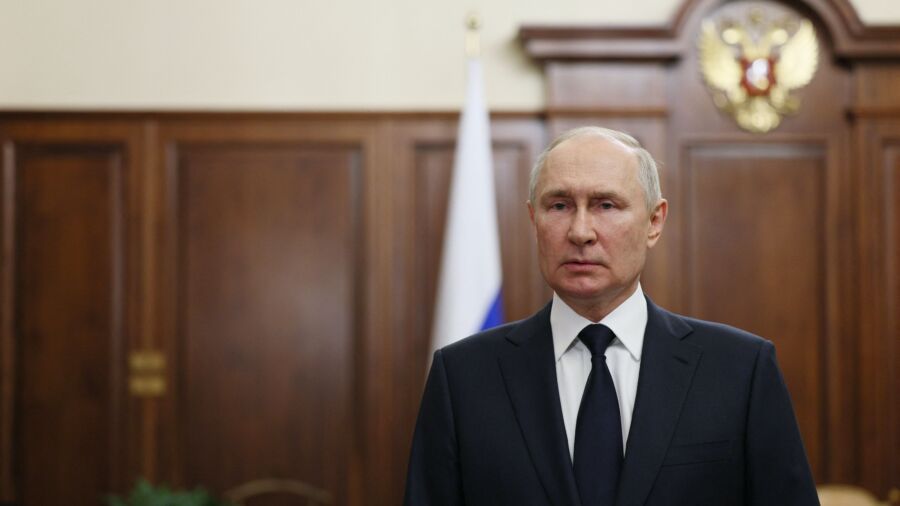Russian President Vladimir Putin said in a televised address that the leaders of the Wagner rebellion knew they would have failed in their mutiny and would have faced dire consequences had they not halted their advance on Moscow, in Putin’s first public comments since the “march” for justice by the mercenary group ended in an uncertain truce on June 24.
Putin’s remarks on June 26 were his first since a fiery speech several days ago while the apparent rebellion was still playing out and in which the Russian leader called the Wagner chief’s actions a “stab in the back” and pledged to crush what he described as a “rebellion.”
Yevgeny Prigozhin, the Wagner leader, on June 24 ordered his fast-advancing troops to stand down and return to base as part of a reported deal in which criminal charges against him would be dropped as he agreed to go into exile in neighboring Belarus.
In his speech on June 26, Putin criticized the leaders of the rebellion and their “criminal activity that aims at weakening the country.”
“The organizers of this rebellion not only betrayed their country and their people, but also betrayed those whom they dragged into this mutiny,” the Russian leader said.
Putin added that “any attempts to stir unrest are doomed to fail,” while claiming that the rebellion would have been thwarted before it reached Moscow as the Kremlin was ready and had made all “necessary decisions to neutralize the threat.”
At the same time, Putin thanked the Wagner fighters for halting their advance, adding that he believes most of them were patriots and that “by turning back, they avoided further bloodshed.”
He added that he would let Wagner fighters relocate to Belarus if they wished, sign contracts with the defense ministry, or simply return to their families.
Ahead of Putin’s much-anticipated speech, speculation swirled around whether the Kremlin–Wagner truce would hold as the mercenary group’s exiled leader issued a statement insisting he wasn’t trying to oust Putin, while Western officials questioned whether another act is yet to play out in the dramatic saga.
Prigozhin Breaks Silence
Prigozhin broke his two-day silence on June 26, after his mercenary fighters on June 24 seized control of a Russian Defense Ministry headquarters in the southern city of Rostov-on-Don before mounting a lightning-fast advance on Moscow.
Prigozhin released an audio message on his Telegram channel on June 26, saying that Wagner’s push toward Moscow wasn’t an attempted coup, but a “march” of protest.
“The purpose of the march was to prevent the destruction of PMC Wagner and to bring to justice those who, through their unprofessional actions, made a huge number of mistakes during the special military operation,” he said in the message.
Russia called its actions in Ukraine a “special military operation” to “de-Nazify” and demilitarize its neighbor, which it accuses of seeking to become a NATO bulwark on Russia’s borders that threatens Moscow’s security.
Days earlier, Prigozhin set out on a warpath against Russia’s Defense Ministry after an alleged attack by the Russian army on his mercenaries’ military camp, which Prigozhin alleged had been ordered by Russian Defense Minister Sergei Shoigu himself.
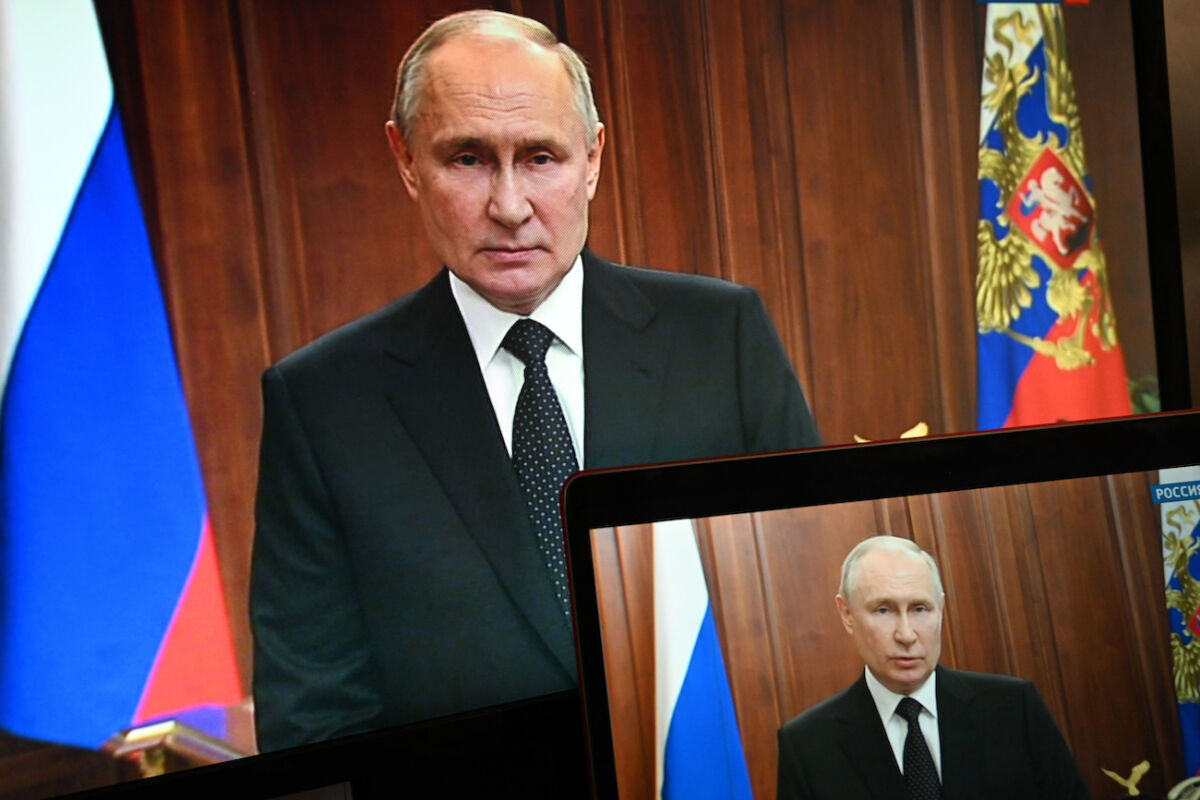
Kremlin Projecting Calm
In a stunning reversal later that day, the Wagner advance on Moscow was abruptly halted in a Belarus-brokered deal with Putin’s supposed blessing that guaranteed Wagner troops would be pardoned and Prigozhin would move to neighboring Belarus.
The Wagner chief on June 24 said he had ordered his troops to return to their bases in Ukraine and continue fighting there on behalf of Russia, while the Belarus President’s Office, which mediated the deal, suggested criminal charges against Prigozhin would be dropped.
After the truce was announced on June 24, Prigozhin left Rostov-on-Don, with some residents giving him and his mutineers a hero’s send-off while he smiled for cameras.
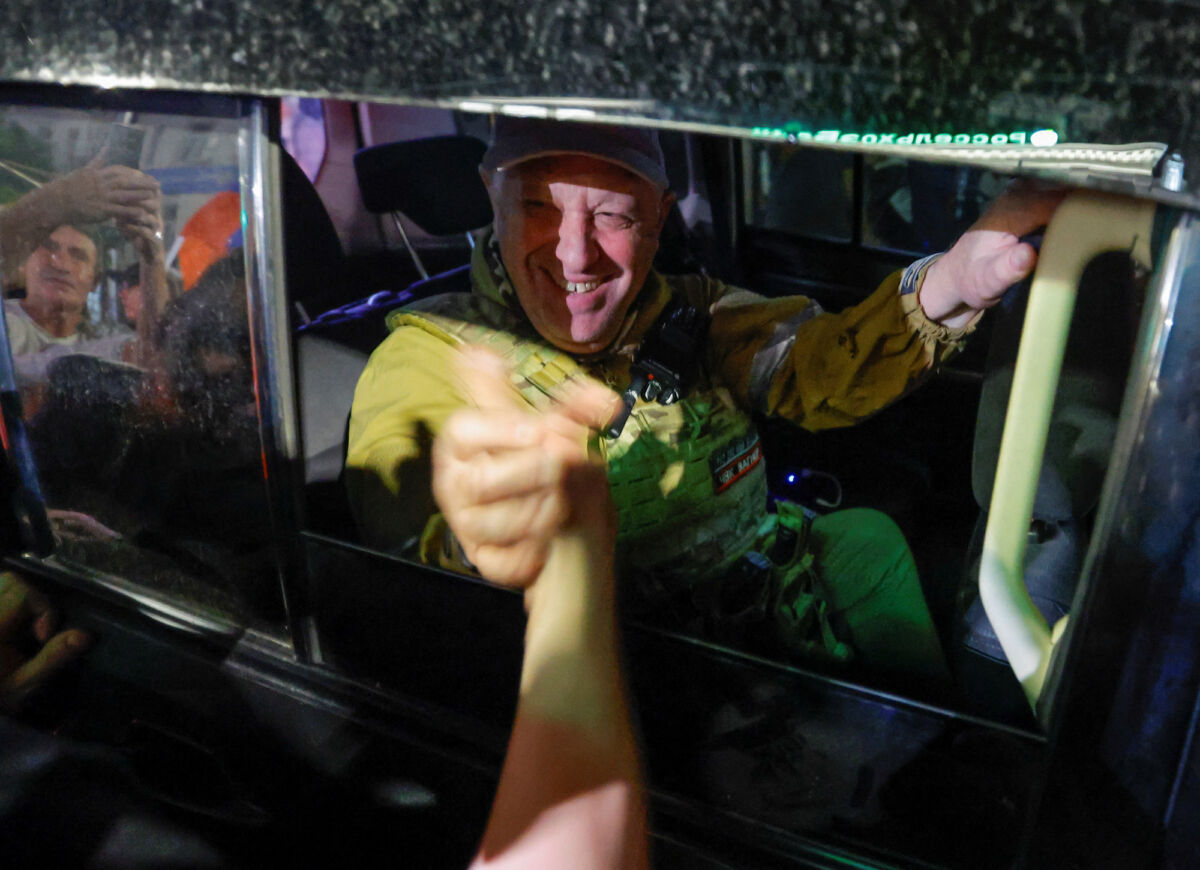
Russia on June 26 sought to project calm, with Shoigu making his first public appearance since the Wagner revolt demanded his ouster.
However, considerable uncertainty remained around the fate of the Wagner–Kremlin truce on the morning of June 26, as reports emerged over the weekend citing anonymous sources within Russia’s Prosecutor General’s Office that the criminal charges against Prigozhin had not in fact been dropped.
Mikhail Mishustin, the appointed prime minister who leads Putin’s Cabinet, openly acknowledged on June 26 that Russia had faced “a challenge to its stability” and made an appeal for public loyalty.
‘Intrigues and Ill-Considered Decisions’
Prigozhin said on June 26 that “as a result of intrigues and ill-considered decisions,” the Russian leadership had decided to break up the Wagner group and that the march on Moscow was meant as an act of protest, not a coup.
“We felt that demonstrating what we wanted to do was enough,” he said, offering an explanation for why the Wagner advance on Moscow was halted and its troops ordered back to base.
In a message on June 24, Prigozhin said that he objected to moves by Russia’s military establishment to disband Wagner.
“They wanted to disband the Wagner military company. We embarked on a march of justice on June 23. In 24 hours, we got to within 200 kilometers of Moscow. In this time, we did not spill a single drop of our fighters’ blood,” he said.
“Now the moment has come when blood could be spilled. Understanding responsibility [for the chance] that Russian blood will be spilled on one side, we are turning our columns around and going back to field camps as planned.”
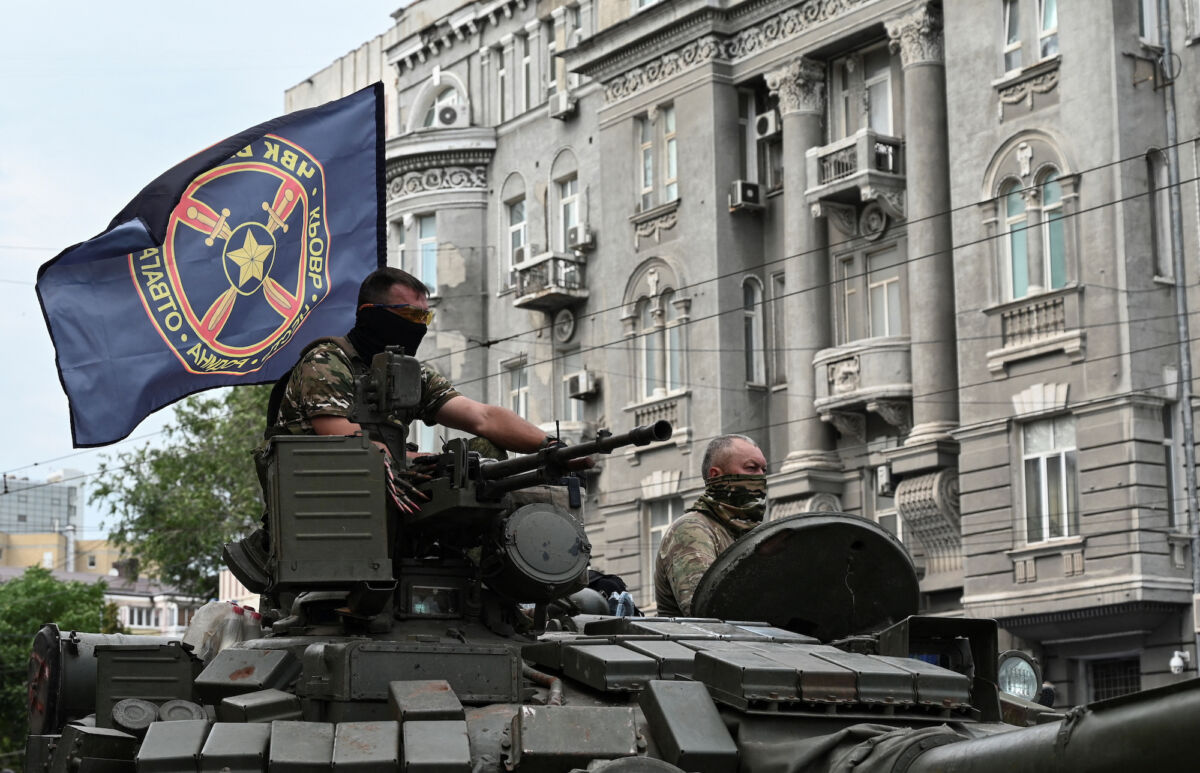
After the Belarus-mediated deal was announced, the Kremlin said it would drop “armed mutiny” charges against Wagner fighters.
“We have always respected their heroic deeds at the front,” Kremlin spokesperson Dmitry Peskov told reporters in Moscow, adding that Russian authorities were grateful to Belarus President Aleksander Lukashenko for his role in deescalating the crisis.
Peskov said that Wagner fighters who didn’t take part in the rebellion would be offered contracts with the Russian Defense Ministry, which had been seeking to bring all autonomous volunteer forces under its control by July 1, an effort that Prigozhin apparently saw as a threat to Wagner’s existence.
It has been reported that, as part of the deal, Prigozhin wouldn’t face any charges. However, several reports published by the state-run RIA Novosti and Interfax news agencies—citing anonymous sources within the Russian government—said that the investigation into the Wagner revolt remains ongoing.
Putin’s speech on June 26 did not address Prigozhin himself nor any potential charges that he might face. The Wagner leader’s current whereabouts remain unclear.
‘Rising Storm’
U.S. Secretary of State Antony Blinken said on June 25 on NBC’s “Meet the Press” that Prigozhin’s criticisms of Russia’s military leadership hurt Russia’s image.
“I think it’s been no secret to many people over many months that these tensions were rising, they were brewing. Prigozhin was already saying some rather extraordinary things about Russia’s conduct of the war in Ukraine and going directly at Russia’s military leadership,” Blinken said. “So this was a rising storm.”
“I think we’ve seen more cracks emerge in the Russian facade. It is too soon to tell exactly where they go and when they get there. But certainly we have all sorts of new questions that Putin is going to have to address in the weeks and months ahead.
“This is a challenge coming from within to Putin, and that’s where his focus has been.”
In a separate interview on CBS’s “Face the Nation,” Blinken called the Kremlin–Wagner saga an “unfolding story.”
“We haven’t seen the last act. We’re watching it very closely and carefully.”
President Joe Biden said on June 26 that the United States and NATO had no involvement in the short-lived mutiny by Wagner, adding that it’s “too early” to assess the effect of the war in Ukraine.
“This was part of a struggle within the Russian system,” Biden said.
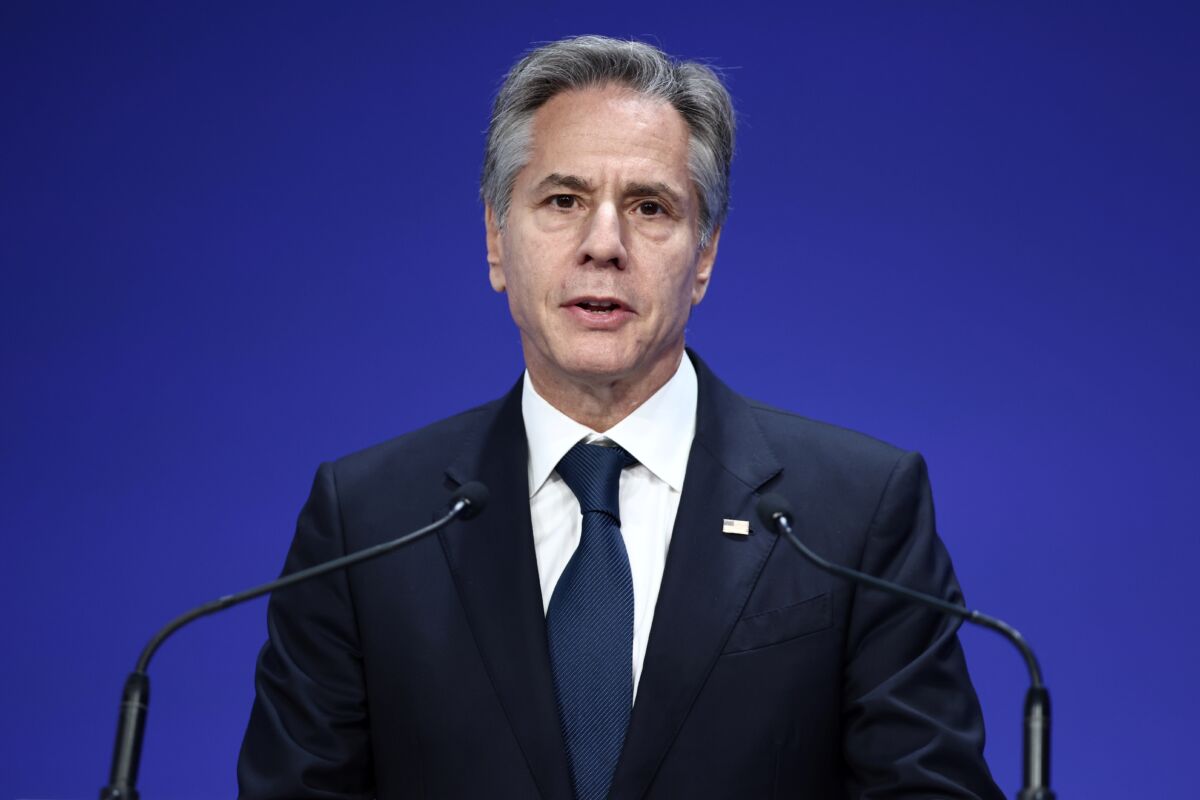
Wagner in Ukraine
The Wagner Group, officially known as PMC Wagner or Wagner Private Military Company, is a Russian paramilitary organization that was first identified in 2014 when it backed pro-Russian separatists in eastern Ukraine.
Amid Russia’s latest “special military operation” in Ukraine, Wagner forces have provided the Kremlin with key support, doing much of the heaviest fighting in the Donbas region and taking significant casualties in the fight for Bakhmut.
However, in the course of Wagner’s engagement in Ukraine, Prigozhin had become increasingly critical of Russia’s military leadership.
Battlefield setbacks in Ukraine, including significant Wagner casualties in bloody shootouts in the fight for Bakhmut, led Prigozhin to level a series of accusations against the military brass, including that they weren’t supplying Wagner with enough ammunition.
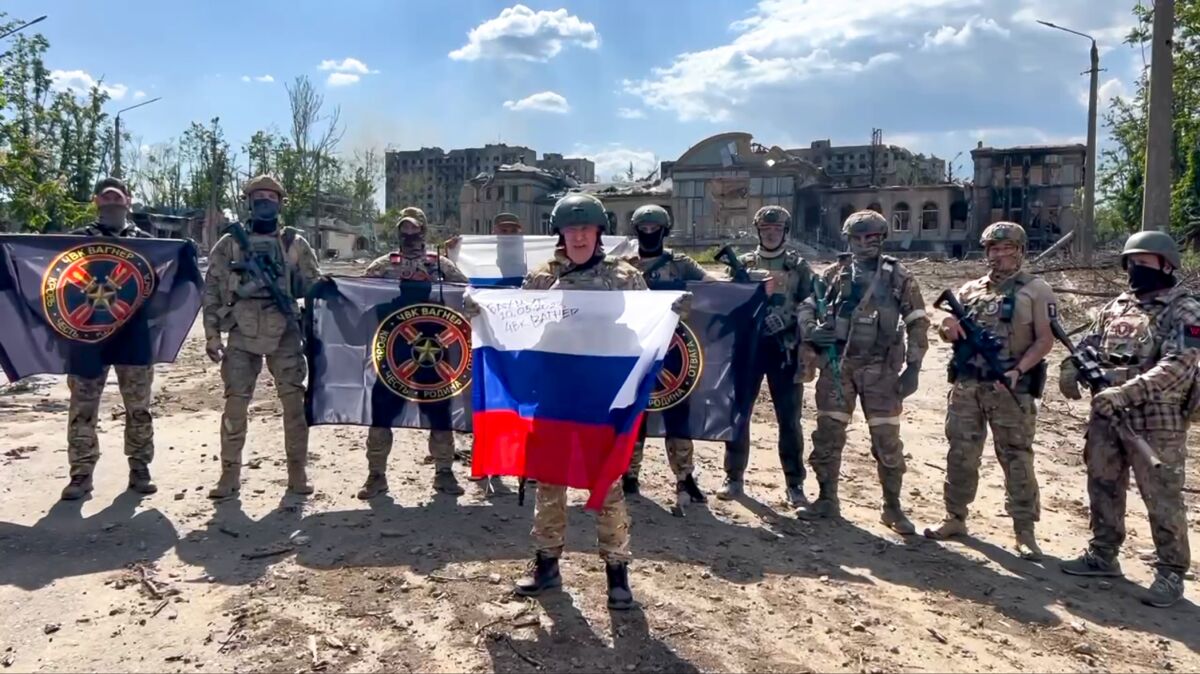
On June 23, on his Telegram channel, Prigozhin accused Shoigu of “destroying” his fighters in an alleged Russian military airstrike and called for an armed mutiny.
*This article has been amended to correct a mistake in the translation of Putin’s remarks. The previous version incorrectly stated Putin vowed that Wagner leaders would be brought to justice, whereas he said that they must have known that their mutiny would fail and that they would have been brought to justice.
From The Epoch Times

